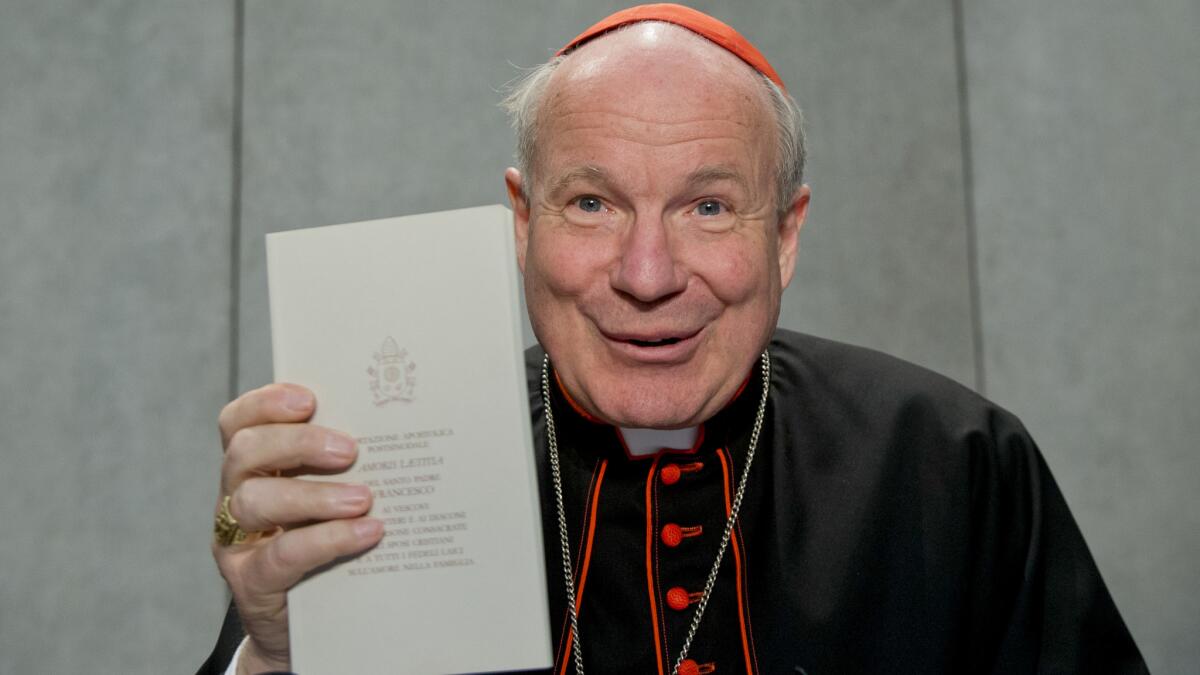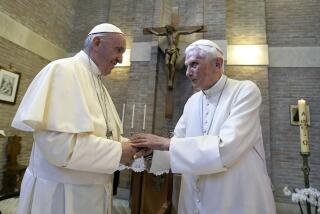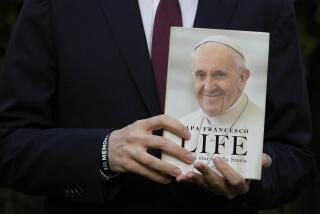Pope Francis eases the way for divorced Catholics, but reiterates opposition to gay unions

Cardinal Christoph Schoenborn holds a copy of Pope Francis’ “Amoris Laetitia” during a news conference at the Vatican on April 8.
Defining his mission to create a more merciful church, Pope Francis published Friday a much-anticipated exhortation on love and marriage, easing the way for remarried, divorced Catholics to rejoin the faith but reiterating limits on same-sex unions and the ban on contraception and abortion.
The 260-page document, the product of several years of debate within the Roman Catholic hierarchy, advocates for flexibility, tolerance and compassion in the church.
But the document, titled “Amoris Laetitia,” Latin for “The Joy of Love,” may disappoint Francis’ legions of liberal fans looking for doctrinal change.
“By thinking that everything is black and white, we sometimes close off the way of grace and of growth,” the pope wrote. “Let us remember that ‘a small step, in the midst of great human limitations, can be more pleasing to God than a life which appears outwardly in order.’”
Church leaders broadly welcomed the pope’s message. “We all have a lot to learn from ‘Amoris Laetitia,’” said Los Angeles Archbishop Jose H. Gomez.
But Catholic liberals and gay groups expressed disappointment, while conservatives remained uncomfortable with granting any leeway that in their view could undermine religious discipline.
To Catholics for Choice, which advocates for abortion rights, the document displayed the “immense chasm” between church policy and everyday Catholic practice.
As he enters the fourth year of his papacy, Francis, the first pontiff from the Americas, has struck a sharp contrast to his predecessor, Benedict XVI, by calling for a more inclusive church. He has traveled to the poorest slums and violent prisons on four continents, washed the feet of Muslims during Easter ceremonies and excoriated the rich and powerful for greed and neglect.
The guidelines released Friday continued that theme, treading a line that is not always predictable. In some areas, he pushes boundaries, while in others he hews to traditional teachings.
The document represents Francis’ final word on a host of family- and life-related issues that were debated at two frequently tense synods at the Vatican, in 2014 and 2015.
The apostolic exhortation gives some wiggle room on granting Communion to remarried divorcees — a hot-button issue that divides Catholic conservatives and progressives and is of special interest to American Catholics.
Currently, the church officially excludes remarried divorced Catholics from Communion because it sees the first marriages as still valid, meaning they are living in sin.
Francis states bluntly that “divorce is an evil” but adds, “It is important that the divorced who have entered a new union should be made to feel part of the Church. They are not excommunicated and they should not be treated as such, since they remain part of the ecclesial community.”
Their exclusion “can be surmounted,” he says, adding that local priests and bishops can work with such couples to that end.
“The Christian community’s care of such persons is not to be considered a weakening of its faith and testimony to the indissolubility of marriage; rather, such care is a particular expression of its charity,” the pope wrote.
The pope admits that the document is not offering “a new set of general rules, canonical in nature and applicable to all cases,” but he appears to leave the door open to bishops and priests to offer Communion on a case-by-case basis.
“Is the pope changing the rules? No,” said Vatican spokesman Greg Burke. “But does he leave daylight? Yes. There is an attitude of welcome.”
On gay unions, Francis is less ambivalent. “De facto or same-sex unions, for example, may not simply be equated with marriage,” he writes. “No union that is temporary or closed to the transmission of life can ensure the future of society.”
Francis is equally forthright on abortion: “So great is the value of a human life, and so inalienable the right to life of an innocent child growing in the mother’s womb, that no alleged right to one’s own body can justify a decision to terminate that life, which is an end in itself and which can never be considered the ‘property’ of another human being.”
Going further, he quotes synod documents that state that “those who work in healthcare facilities are reminded of the moral duty of conscientious objection,” and adds that “the Church strongly rejects the forced State intervention in favor of contraception, sterilization and even abortion. Such measures are unacceptable even in places with high birth rates, yet also in countries with disturbingly low birth rates we see politicians encouraging them.”
Francis’ views reflect Catholic doctrine, but his words will have extra resonance in the U.S. during an election year.
Gomez said the pope’s message comes at a critical time, when the meaning of marriage, family and love is “confused and disputed in our society.” The archbishop said he was encouraged by what the pope said about preparing couples for marriage and the need to approach “wounded families” with compassion.
“We need to inspire people to see marriage and family as God’s way for their lives, and to call them to this adventure in lifelong love that grows deeper through the sharing of joys and trials and the bringing of new life into the world,” Gomez said in a statement.
Blase Cupich, the archbishop of Chicago, said conservative Catholics who shun the idea of divorce should not be worried about the document’s conciliatory tone.
“It is not a slippery slope, but a pathway forward for people who have otherwise found themselves stuck,” Cupich said at a news conference. The pope’s “ability to really be sensitive to the human situation in life continues to amaze me. … He’s got an intuition about where people live their actual lives. He’s not living in a bubble.”
Catholics for Choice found the papal exhortation lacking.
“The law says one thing, but Catholics the world over behave according to their conscience,” Jon O’Brien, the group’s president, said in a statement. “How you apply the law matters — it’s what drives people away.”
O’Brien acknowledged that Francis’ pastoral approach represented a “breath of fresh air” compared with his predecessors. But, he added, the pope again condemned abortion and went “back to the party line about contraception” to “shore up any concerns that conservatives may have that real change is possible.”
All this, O’Brien said, despite the fact that about 1 in 4 Catholics in the United States has been divorced.
DignityUSA, a Catholic group that advocates for rights for lesbian, gay, bisexual and transgender Catholics and their families, said the pope failed to fully embrace an entire community.
“Pope Francis has continued the characterization of LGBT people as unable to fully reflect the fullness of God’s plan for humanity,” executive director Marianne Duddy-Burke said in a statement. “This document continues to demonstrate a tragic ignorance.”
American Catholics, especially, had eagerly awaited the pope’s newest instructions.
“I think he’s going in the right direction, because society is changing,” said Israel Mondragon, 45, a Catholic hairdresser in Washington, who married and baptized his daughter in the U.S. capital’s Cathedral of St. Matthew the Apostle and attended weekly services there until moving to the suburbs.
“The conservatives will say, oh, this is ruining the church,” he added. “I’d like to hear what my mom says.”
Between the tough words on abortion and gay marriage, the document dwells at length on how to shore up the institution of marriage, offering guidance on how to build a loving family with tips on forgiveness, patience and sex.
He says the church has spent too long waving rule books at families instead of giving constructive advice on how to avoid breakups. And, in keeping with one of his more introspective tendencies, Francis urges a “healthy dose of self-criticism” in the church.
“We have long thought that simply by stressing doctrinal, bioethical and moral issues, without encouraging openness to grace, we were providing sufficient support to families, strengthening the marriage bond and giving meaning to marital life,” he writes.
To illustrate his point, Francis quotes the 1987 film “Babette’s Feast”: “The most intense joys in life arise when we are able to elicit joy in others, as a foretaste of heaven,” he writes. “We can think of the lovely scene in the film ‘Babette’s Feast,’ when the generous cook receives a grateful hug and praise: ‘Ah, how you will delight the angels!’”
He added: “We often present marriage in such a way that its … call to grow in love and its ideal of mutual assistance are overshadowed by an almost exclusive insistence on the duty of procreation.” Clergy, he writes, too often emphasize an abstract and “almost artificial” theology of marriage, rather than “the concrete situations and practical possibilities of real families.”
“We have often been on the defensive,” Francis says, “wasting pastoral energy on denouncing a decadent world without being proactive in proposing ways of finding true happiness.”
Special correspondent Kington reported from Vatican City and staff writers Wilkinson from Washington and Parvini from Los Angeles.
MORE WORLD NEWS
For just $309, you too can hide your assets — in the U.S.
13 North Korean workers at foreign restaurant defect, Seoul officials say
San Diego freelance photographer held in Syria is freed, State Department says
More to Read
Start your day right
Sign up for Essential California for news, features and recommendations from the L.A. Times and beyond in your inbox six days a week.
You may occasionally receive promotional content from the Los Angeles Times.








